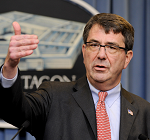At a time of enormous doubt and dismay on both sides, President Obama’s impending choice of a new U.S. ambassador to India has assumed greater importance. His appointment will reflect where he places India-U.S. relations on his list of priorities.
Obama’s lack of interest and that of his key advisers in steering the relationship is palpable. The India-U.S. partnership has been repeatedly tested and buffeted – often by needless provocations – over the past three years with little or no political intervention. The question is how long it can stand the tide of negativity before going back to the old default mode.
Presuming that he doesn’t want to leave less in the India account than what he inherited from his predecessor George W. Bush, there is still time for Obama to repair and remodel the strategic partnership and avoid the blot of “losing” India.
If Narendra Modi becomes India’s new prime minister, there may be additional awkwardness given the history over his U.S. visa. Modi will likely be pragmatic about relations with the United States but the potential for problems can’t be ruled out.
The American ambassador would be crucial in starting off on the right foot with the new government in New Delhi.
Who goes as America’s envoy to India is important at any time but in difficult times, even more so. There are two broad possibilities: Obama could use the position as a “reward” for domestic political gains or use it for actual foreign policy objectives.
The names currently in the mix are Ashton Carter, former deputy secretary of defence, Rajiv Shah, head of USAID who has raised money for Obama, Sonal Shah, an economist who served as Director of the Office of Social Innovation and Civic Participation in the White House for two years after Obama took office and finally Richard Verma, a lawyer close to Hillary Clinton who served as the Assistant Secretary of State for Legislative Affairs but left in 2011 to join a law firm Steptoe & Johnson as senior counselor. Verma was the administration’s lead negotiator with the U.S. Congress on Iran sanctions.
Howard Berman, a former Congressman from California, and Jim McDermott, a 77-year-old Congressman from Washington state are apparently also interested.
But Carter’s name has aroused the most enthusiasm among India watchers because of his proven record and definite gravitas. But it may be hard to get him – it is said he quit when Obama didn’t make him Secretary of Defence after Leon Panetta left.
The fact that all other candidates being talked about are Indian Americans indicates that the Obama administration has domestic politics on its mind. By appointing an Indian American, it perhaps hopes to further solidify Democratic Party support within the community.
But would it be wise to send an Indian American to India at this time when the image of a crusading Preet Bharara who drove a stake through bilateral relations with the Khobragade affair is so fresh?
Curiously, the name of Rajiv Shah was mentioned in the Indian media within hours of Ambassador Nancy Powell’s resignation in New Delhi. Never before has a potential name percolated so fast from Washington to New Delhi but Shah’s prospects may have dimmed just as fast as they rose.
He is no longer a safe bet in terms of a senate confirmation. Last week he was in the middle of “Twittergate,”defending USAID’s funding of “Cuban Twitter” or ZunZuneo with the aim of undermining the Cuban government. The Cubans were unaware they were part of a secret U.S. government programme and that their personal data were being collected, according to an investigation by the Associated Press. Shah may also face questions about his fundraising role for Obama.
Verma’s name on the other hand appears to be an effort by Hillary Clinton’s acolytes to have her supporters in place before 2016. He was her principal adviser when Clinton was Secretary of State and a lead negotiator with the U.S. Congress on budget and policy issues. He is also associated with the Centre for American Progress, a partisan, liberal think tank better known as Hillary Tank.
Shah and Verma may be the rising stars within the Democratic Party but do they have the weight to move America’s difficult and gargantuan bureaucracies towards policy coherence? Not yet would be the answer.
But Ashton Carter has a proven record on that score. He breathed oxygen into the India-U.S. defence relationship when all else was stalling. He worked with New Delhi on taking it from a “buyer-seller” equation to contemplating co-production and co-development of defence equipment.
Carter is also credited with rationalising U.S. export controls which are not even grasped fully by those who must implement them. If anything is normal in bilateral relations, it is the defence relationship and much of the credit goes to his leadership role.
He has the necessary experience in navigating various agencies and forcing decisions. He can cut through the thicket of approvals and get his phone calls answered by Washington. Besides, he is a respected academic with expertise on nuclear non-proliferation. It would be difficult for recalcitrant bureaucrats to run rings around him.
Would the best person win?
Seema Sirohi is a Washington-based analyst and a frequent contributor to Gateway House: Indian Council on Global Relations. Seema is also on Twitter, and her handle is @seemasirohi
This article was exclusively written for Gateway House: Indian Council on Global Relations. You can read more exclusive content here.
For interview requests with the author, or for permission to republish, please contact outreach@gatewayhouse.in.
© Copyright 2014 Gateway House: Indian Council on Global Relations. All rights reserved. Any unauthorized copying or reproduction is strictly prohibited


